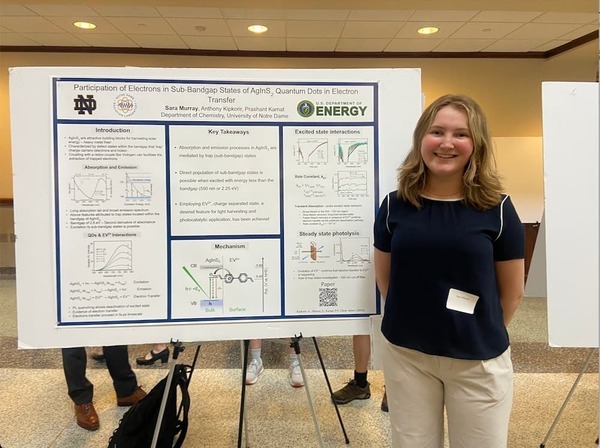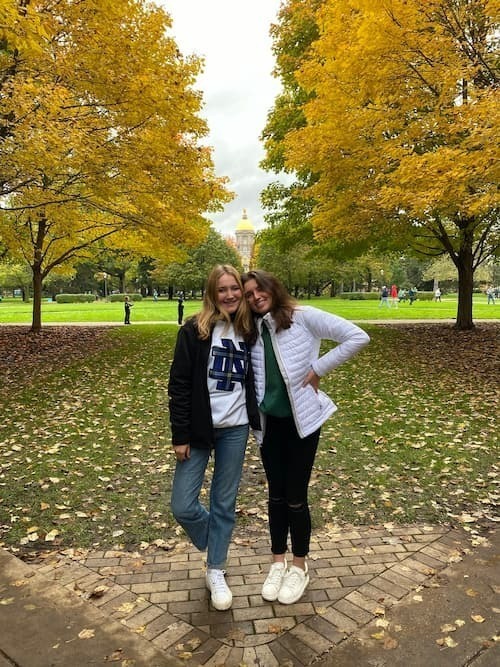Building a Greener Future: Sara Murray '25 Pursues Research in Renewable Energy
Sara Murray is a rising senior studying chemistry computing and energy studies through Notre Dame's College of Science.
Originally from Los Angeles, California, Murray says she became interested in pursuing research in renewable energy after witnessing hostile environmental impacts in her hometown, including wildfires, earthquakes, and severe droughts.
Murray began to look for research opportunities as a rising sophomore after noting which courses she found most interesting and realizing she was most drawn to being in the lab. She started looking for opportunities on the ND Energy website. She emailed several professors conducting research but felt most excited about the work of Professor Prashant Kamat in the Department of Chemistry and Biochemistry.

“The research focuses on energy transfer or electron transfer from quantum dots to acceptor molecules. We're looking at different materials to harness solar energy so that solar cells are more efficient, stable, and faster,” explains Murray. (Read more about the research.)
Finding Resarch Opportunities at Notre Dame
Murray remembers how overwhelmed she felt as a first-year student thinking about securing research opportunities. After stepping into research, Murray notes how Notre Dame provides support for undergraduate students who are still developing skills in research and in the lab. The Kamat lab provides undergraduate students with mentors to help them develop the essential skills they will need to continue their academic careers into graduate school and beyond.
She says, “As an undergraduate, you may not entirely understand what you’re researching, but I don’t think it takes away from the experience. Your mentors are going to teach you how to read a paper, come up with new experiment ideas, think of new projects, or even the basics like how to use a pipette.”
Securing Funding for Undergraduate Research
To support her early academic research, Murray secured funding through the International Research Experience for Students (IRES), funded by the National Science Foundation in partnership with Notre Dame. In the summer of 2023, Murray participated in the IRES program at the University of Heidelberg in Germany to conduct research and received funding for travel expenses, housing, and a stipend to conduct research for 10 weeks.
For her current research on campus, Murray was awarded the Vincent P. Slatt Fellowship for Undergraduate Research in Energy Systems and Processes, provided through Notre Dame’s Research Experience for Undergraduates.
Advice to Incoming First-Year Students
As Murray reflects on her own journey at Notre Dame, she advises prospective students and incoming first-years to take a beat during their first semester in college and absorb the entire college experience before jumping into research.

“I think for me, freshman fall was just a time to learn what college was and to find friends, to live in a dorm, and to notice the courses I liked the best," says Murray. "Notre Dame offers so much support, especially the professors, so you’ll be fully supported in any way that you show up.”
Murray is grateful for the opportunities and support available at Notre Dame that have allowed her to explore and develop her research skills while helping her to prepare for applying to graduate school. Along with four friends, Murray started a club for students thinking of attending graduate school called STEM Pre-Grad Club. They plan to host events with current Notre Dame professors and alumni to provide advice for students looking to join labs or gain more research experience. Connect with them at the annual Activities Night this fall.
As she looks forward to her senior year and beyond, Murray remains committed to her goal of making a positive impact on the environment through scientific research. With her eyes set on graduate school, Murray is poised to continue her work in creating innovative solutions to some of the most pressing environmental challenges of our time, saying, “The idea that I’m capable of using my skills and my knowledge to help create a better environment is really motivating and I am excited for what is ahead of me in the future.”
Originally published by at admissions.nd.edu on July 08, 2024.
Latest Research
- Seven engineering faculty named collegiate professorsSeven faculty members in the Notre Dame College of Engineering have been named collegiate professors—a prestigious title awarded by the university and college in recognition of excellence in research, teaching and service. The designation may be conferred on faculty at the assistant, associate or…
- ‘A special challenge’: German studies scholar wins National Humanities Center fellowship for research on medieval womenFor CJ Jones, the joy of research is not the answers but the journey. And the next step on that journey is a fellowship with the National Humanities Center. …
- Notre Dame Lead Innovation Team partners with local WIC program to identify, prevent lead poisoning in childrenB.A.B.E. store “shoppers” now have something new to help their families: free lead screening kits offered by the University of Notre Dame’s Lead Innovation Team.
- Notre Dame Welcomes Ninth Cohort of Warrior-Scholars for Transformative Academic JourneyNOTRE DAME, IN – The University of Notre Dame recently concluded its ninth successful Warrior-Scholar Project (WSP) boot camp, hosting 34 dedicated Warrior-Scholars from June 21st to 28th. This intensive, week-long academic residency provided transitioning service members and veterans…
- Entrepreneurship and Empowerment in South Africa study abroad program celebrates 25 yearsThis year, the Entrepreneurship and Empowerment in South Africa (EESA) program marked its 25th year of operation. EESA is a six-week summer study abroad program that enables students to help historically…
- Vatican honors Martin and Carmel Naughton with papal awardCarmel…













